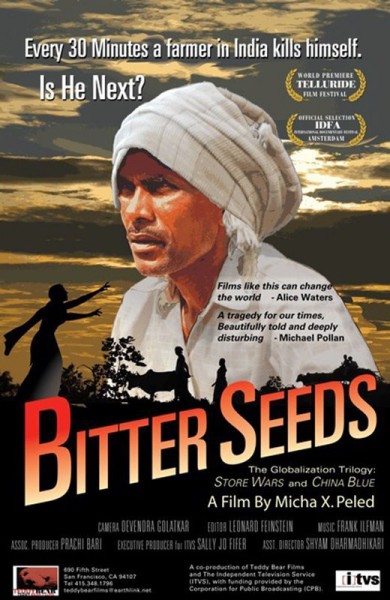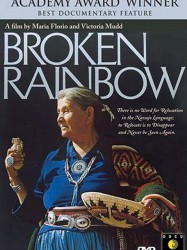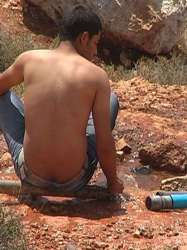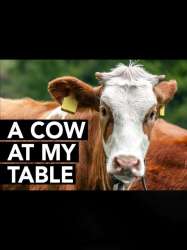Bitter Seeds est un film américain de genre Documentaire
Bitter Seeds (2011)

Si vous aimez ce film, faites-le savoir !
- Infos
- Casting
- Infos techniques
- Photos
- Vidéos
- Passages TV
- Citations
- Personnages
- Musique
- Récompenses
Durée 1h28
OrigineEtats-Unis
Genres Documentaire
Themes L'environnement, Documentaire sur le monde des affaires, Documentaire sur l'environnement, Documentaire historique, Documentaire sur la politique, Politique
Note76%










Bitter Seeds is a 2011 documentary film by American filmmaker and director and political commentator Micha Peled. The film is the third part of Peleds globalization trilogy after Store Wars: When Wal-Mart Comes to Town and China Blue.
Synopsis
Micha Peled's documentary on BT farming in India observes the impact of genetically modified cotton on India's farmers, with a suicide rate of over a quarter million Bt cotton farmers each year due to financial stress resulting from massive crop failure and the price of Monsanto's Bt seeds. The film also disputes claims by the biotech industry that Bt cotton requires less pesticide and promises of higher yields, as farmers discover that Bt cotton requires more pesticide than organic cotton, and often suffer higher levels of infestation by Mealybug resulting in devastating crop losses, and financial and psychological stress on cotton farmers. Due to the biotech seed monopoly in India, where Bt cotton seed has become the standard, and organic seed has become unobtainable, thus pressuring cotton farmers into signing Bt cotton seed purchase agreements with biotech multinational corporation Monsanto.Commentaires
Postez un commentaire :
Suggestions de films similaires à Bitter Seeds
Il y a 8954 ayant les mêmes genres cinématographiques, 9152 films qui ont les mêmes thèmes (dont 5 films qui ont les mêmes 6 thèmes que Bitter Seeds), pour avoir au final 70 suggestions de films similaires.Si vous avez aimé Bitter Seeds, vous aimerez sûrement les films similaires suivants :

The Last Mountain (2011)
, 1h35Origine Etats-Unis
Genres Documentaire
Thèmes L'environnement, Documentaire sur le monde des affaires, Documentaire sur l'environnement, Documentaire historique, Documentaire sur la politique, Documentaire sur les technologies, Politique
Note76%






海と夕陽と彼女の涙 ストロベリーフィールズ (2006)
, 1hOrigine Israel
Genres Drame, Documentaire, Fantasy
Thèmes Afrique post-coloniale, L'environnement, Religion, Documentaire sur le monde des affaires, Documentaire sur le droit, Documentaire sur l'environnement, Documentaire sur la guerre, Documentaire historique, Documentaire sur une personnalité, Documentaire sur la politique, Documentaire sur la religion, Politique, Religion juive
Acteurs Mitsuki Tanimura, Yuria Haga
Strawberry Fields points out that strawberries grown in Gaza are the only agricultural product marketed internationally as being of Palestinian origin. One of the major Gaza strawberry farms in located at Beit Lahiya. More than 1,500 tons of strawberries are exported from Gaza to Europe through the Israeli company Agrexco. In order to get overseas, however, the fruits need to pass through the checkpoint that separates Israel and Gaza. The 2005–2006 growing season coincided with the Israel's disengagement from Gaza and the rise of Hamas as the ruling political entity. The armed conflict between Israel and Hamas resulted in the closing of the border checkpoint. The strawberries grown at Beit Lahiya cannot leave Gaza, resulting in significant losses for the farmers and their Agrexco partners. Unable to transport their produce, the farmers have no choice but to dispose of their crop and prepare for the following year’s growing season.

King Corn (2007)
, 1h28Origine Etats-Unis
Genres Documentaire
Thèmes L'environnement, Documentaire sur le monde des affaires, Documentaire sur l'environnement, Documentaire historique, Documentaire sur la politique, Politique
Acteurs Ian Cheney, Curtis Ellis
Note69%






Palestine - Les 18 fugitives (2014)
, 1h15Origine Canada
Genres Documentaire, Animation
Thèmes Afrique post-coloniale, Mise en scène d'un animal, L'environnement, Religion, Le monde du travail, Documentaire sur le monde des affaires, Documentaire sur le droit, Documentaire sur l'environnement, Documentaire sur la guerre, Documentaire historique, Documentaire sur la politique, Documentaire sur la religion, Documentaire sur le monde du travail, Mise en scène d'un bovin, Politique, Religion juive, Mise en scène d'un mammifère
Note71%





L'œuvre présente les efforts des Palestiniens habitant la ville et la région de Beit Sahour, en Cisjordanie, pour démarrer une petite industrie laitière locale au cours de la première Intifada, en cachant un troupeau de dix-huit vaches laitières aux forces de sécurité israéliennes qui considérait la production de laitages comme une menace pour la sécurité nationale d'Israël.

Broken Rainbow (1985)
, 1h10Origine Etats-Unis
Genres Documentaire, Historique
Thèmes L'environnement, Documentaire sur le monde des affaires, Documentaire sur le droit, Documentaire sur l'environnement, Documentaire historique, Documentaire sur une personnalité, Documentaire sur la politique, Politique
Acteurs Buffy Sainte-Marie, Dennis Banks, Martin Sheen, Burgess Meredith
Note67%






Mugabe et l'Africain blanc (2009)
, 1h30Origine Royaume-uni
Genres Documentaire
Thèmes Afrique post-coloniale, L'environnement, Le racisme, Documentaire sur le monde des affaires, Documentaire sur la discrimination, Documentaire sur le droit, Documentaire sur l'environnement, Documentaire sur une personnalité, Documentaire sur la politique, Politique
Note76%





En 2008, Mike Campbell – l’un des derniers fermiers blancs au Zimbabwe face au violent programme de réforme agraire – prend le risque sans précédent d’attaquer le Président Robert Mugabe devant le tribunal du SADC (Communauté de Développement Sud-Africain) afin de défendre ses droits. Son exploitation agricole emploie plus de 500 travailleurs et abrite également leurs familles. Mike Campbell accuse Mugabe et son gouvernement de discrimination raciale et de violation des Droits de l’Homme. Embarqués dans un procès hors du commun, Mike et sa famille vont devoir faire face à la violence et à la cruauté du régime du dictateur. Ce documentaire retrace leur combat.

Zramim Ktu'im (2010)
, 1h15Origine Israel
Genres Documentaire
Thèmes Afrique post-coloniale, L'environnement, Religion, Documentaire sur le droit, Documentaire sur l'environnement, Documentaire sur la guerre, Documentaire historique, Documentaire sur une personnalité, Documentaire sur la politique, Documentaire sur la religion, Politique, Religion juive
Paths of lives are crossed in one village in the West Bank. Along the broken water pipelines, villagers walk on their courses towards an indefinite future. Israel that controls the water, supplies only a small amount of water, and when the water streams are not certain nothing can evolve. The control over the water pressure not only dominates every aspect of life but also dominates the spirit. Bil-in, without spring water, is one of the first villages of the West Bank where a modern water infrastructure was set up. Many villagers took it as a sign of progress, others as a source of bitterness. The pipe-water was used to influence the people so they would co-operate with Israel’s intelligence. The rip tore down the village. Returning to the ancient technique of collecting rainwater-using pits could be the villagers’ way to express independence but the relations between people will doubtfully be healed.

A Cow at My Table (1998)
, 1h30Réalisé par Jennifer Abbott
Origine Canada
Genres Documentaire
Thèmes Mise en scène d'un animal, L'environnement, Documentaire sur le monde des affaires, Documentaire sur la protection animale, Documentaire sur le droit, Documentaire sur l'environnement, Documentaire sur la politique, Mise en scène d'un bovin, Politique, Documentaire sur la nature
 , 1h
, 1hRéalisé par Saul Landau
Genres Documentaire
Thèmes L'environnement, Documentaire sur l'environnement, Documentaire sur la guerre, Documentaire historique, Documentaire sur le nucléaire, Documentaire sur la politique, Documentaire sur les technologies, Politique
Acteurs Saul Landau

Your Mommy Kills Animals (2007)
, 1h45Origine Etats-Unis
Genres Documentaire
Thèmes Mise en scène d'un animal, L'environnement, Politique, Le terrorisme, Documentaire sur la protection animale, Documentaire animalier, Documentaire sur le droit, Documentaire sur l'environnement, Documentaire sur la guerre, Documentaire historique, Documentaire sur la politique, Documentaire sur le terrorisme, Politique, Documentaire sur la nature
Note65%





The film reports on controversies concerning and within the animal rights movement. These include external conflicts between animal rights advocates and medical researchers and restaurant operators, and internal disagreements within the animal rights movement between the animal shelter operators and the confrontationalists who demonstrate outside homes of corporate opponents. The film also discusses the comparison between animal liberation activists and political terrorists, including the FBI's ranking of animal-rights activists as the nation's No. 1 domestic terrorism threat.
 Connexion
Connexion